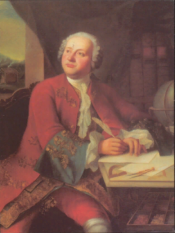
Mikhail Lomonosov – a student and teacher. The Presidential Library illustrates scientist’s life and career
November 19, 2022 marks the 311th anniversary of the birth of Mikhail Lomonosov, an encyclopedic scientist, educator, poet, founder of Moscow University.
The Presidential Library’s portal features the collection Mikhail Lomonosov (1711–1765), which includes both the works of the scientist and scientific and biographical studies about him. On the eve of the upcoming 2023, declared by the Decree of the President of Russia as the Year of the Teacher and Mentor, the history of Lomonosov's studies and his subsequent pedagogical activity deserve special attention.
The first teacher of Mikhail, who was born in the family of a fisherman in the village of Denisovka near the city of Kholmogory on the Northern Dvina, was a literate fellow villager. After reading church books, the future scientist called Smotrytsky’s “Grammar” and Magnitsky’s “Arithmetic” “the gates of his learning”. The boy was so afraid of losing them that he learned by heart. Professor Vasily Sipovsky spoke about this in the preface to "Selected Works" (1911) by Lomonosov.
The craving for knowledge led the 19-year-old boy to Moscow, to the Slavic-Greek-Latin Academy at the Zaikonospassky Monastery. To enter there, he called himself not a peasant, but a noble son. In addition to studying theological sciences, Lomonosov studied Latin and Greek, read many books in the academic library.
From 1736 to 1739 he studied with the famous mathematician and philosopher Christian Wolff. Widely and comprehensively educated, he was distinguished by a benevolent attitude towards young people. From his teacher, Lomonosov heard something that was especially dear to him: "Believe your mind if your mind is enlightened by the light of knowledge". It is no coincidence that “the sensitive, enthusiastic Lomonosov even wept at parting with the one who had given him so much”, - wrote Sipovsky.
The lessons of another teacher, Johann Friedrich Henckel, dissatisfied Lomonosov. The quarrels began and he arbitrarily left his studies in Germany.
Upon returning to St. Petersburg, Lomonosov in 1742 was appointed adjunct of the Academy of Sciences in the class of physics, and in 1745 - professor of chemistry, and became an academician. He was the first in Russia to start giving public lectures to students on natural science and philology in Russian.
According to literary historian Boris Modzalevsky, author of the catalog of the exhibition "Lomonosov and the Elizabeth Time" (1912), the success of the Academy's scientific endeavors, the streamlining of its administrative activities, the Empress Elizabeth Petrovna's attention to the Academy, the approval of its Regulations in 1747 - all this is associated with the activities of Mikhail Lomonosov.
On January 12, 1755 Moscow University was founded "with the active and ardent sympathy and participation of Lomonosov, who saw at the University a new way" to increase the sciences, therefore to the true benefit and glory of the fatherland"". Moscow University embodied the scientist's ideas about the development of Russian education.
Simultaneously with the university, two gymnasiums were opened - noble and common. In the "Project Regulations of the Moscow Gymnasiums" and in the later "Project Regulations of the Academic Gymnasium" similar to it, Lomonosov most fully outlined his main pedagogical ideas. The scientist wrote: “The gymnasium is the first foundation of all liberal arts and sciences. It is to be expected that educated youth will come out of it: young people should be accustomed there to the right way of thinking and good morals”.
In both documents, almost all aspects of the education of children in the gymnasium were examined in the most detailed way. For the first time in the history of Russian pedagogy, Lomonosov took on the solution of cardinal issues: the methods and principles of teaching, the organization of the classroom system, the development of teaching methods, and others. Lomonosov's didactic ideas were formed under the influence of familiarity with the experience of teaching in Russian and foreign schools based on his own pedagogical activity. He checked the theoretical moments, being a teacher-practitioner.
All the pedagogical activity of Mikhail Lomonosov in Russia, his works on the development of Russian science, on the dissemination of education and education among the population, which he understood as a continuation of the work begun by Peter I, were the embodiment of the words of the scientist: “No! I am not one of those people who will only open the way to happiness for themselves by teaching, at the same hour... they will leave science”.

